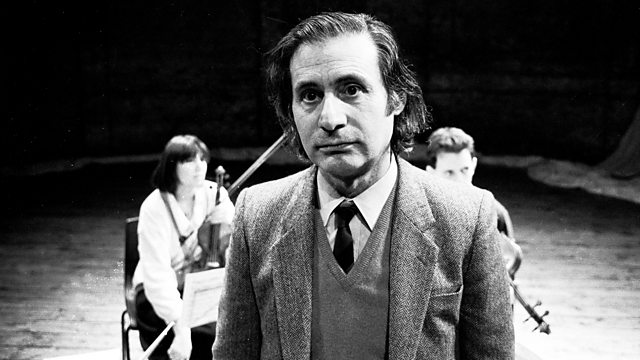
1985: Triumph and Catastrophe
Donald Macleod explores the strange, brilliant and sometimes nightmarish world of Alfred Schnittke. Today, the year 1985 brings professional success, but personal catastrophe.
Donald Macleod explores the strange, brilliant and sometimes nightmarish world of the Soviet composer Alfred Schnittke. Today - the year 1985 brings great musical success...and personal catastrophe.
The music of Alfred Schnittke (1934-1998) is like being lost in a hall of mirrors. Staring back at you is the whole of music history - from Bach to modern pop via tangos, Soviet work songs, Gregorian chant and Viennese waltzes - refracted and distorted, and woven together to create a uniquely personal style. Thrilling, grotesque, occasionally nightmarish - Schnittke creates a world where everything has a hidden meaning. Beethoven's Fifth suddenly springs terrifyingly out of the darkness in the midst of an otherwise chaotic symphony. Or a cheap Russian pop song appears inexplicably amidst a Baroque chorale. Schnittke's world of suppressed meanings perfectly captured life under the cosh of Soviet Communism. All this week, Donald Macleod unpicks the strands of a musician often seen as the heir to Shostakovich - and perhaps the last truly great composer of the 20th century.
The year 1985 was perhaps the most important of Schnittke's entire life - for reasons both musically brilliant, and personally catastrophic. It saw the creation of a quintet of acknowledged masterpieces of the late 20th century, cementing Schnittke's position as perhaps the greatest Russian composer since Shostakovich. Yet it was also the year Schnittke suffered the first of a series of debilitating strokes, which would eventually kill him at the relatively young age of 63. Donald Macleod introduces music from this period, including the must-loved Viola Concerto and Fourth Concerto Grosso, which simultaneously functions as Schnittke's Fifth Symphony.
Moz-Art A La Haydn
Tero Latvala, Meri Englund, violins
Tapiola Sinfonietta
Ralf Gothoni, conductor
Viola Concerto (1st & 2nd mvts)
Yuri Bashmet, viola
USSR Ministry of Culture Symphony Orchestra
Mstislav Rostropovich, conductor
Concerto Grosso No 4 / Symphony No 5 (2nd mvt)
Royal Concertgebouw Orchestra
Riccardo Chailly, conductor
Doctor Faustus lamented and wept...It came to pass (Faust Cantata)
Inger Blom, mezzo
Mikael Bellini, countertenor
Louis Devos, tenor
Ulrik Cold, bass
Malmo Symphony Orchestra & Choir
James DePriest, conductor
Menuet, for violin, viola and 'cello
Gidon Kremer, violin
Yuri Bashmet, viola
Mstislav Rostropovich, cello.
Last on
Music Played
-
![]()
Alfred Schnittke
Moz-Art a la Haydn
Performer: Tero Latvala. Performer: Meri Englund. Orchestra: Tapiola Sinfonietta. Conductor: Ralf Gothóni.- Moz-Art a la Haydn.
- BIS.
- 2.
-
![]()
Alfred Schnittke
Viola Concerto
Performer: Yuri Abramovich Bashmet. Conductor: Mstislav Rostropovich. Orchestra: State Symphony Orchestra of the Ministry of Culture of the USSR.- RCA RD60446.
- RCA.
- 3.
-
![]()
Alfred Schnittke
Concerto Grosso No. 4
Orchestra: Royal Concertgebouw Orchestra. Conductor: Riccardo Chailly.- DECCA 4788355.
- Decca.
- 7.
-
![]()
Alfred Schnittke
Faust Cantata
Singer: Inger Blom. Singer: Mikael Bellini. Singer: Louis Devos. Singer: Ulrik Cold. Choir: Malmö Symfonikör. Conductor: James DePreist. Orchestra: Malmö SymfoniOrkester.- BIS : CD437.
- BIS.
- 9.
-
![]()
Alfred Schnittke
Minuet for Violin, Viola and Cello
Performer: Mstislav Rostropovich. Performer: Yuri Abramovich Bashmet. Performer: Gidon Kremer.- Warner Classics 9029586395.
- Warner Classics.
- 8.
Broadcast
- Thu 2 Aug 2018 12:00���˿��� Radio 3
Beethoven Unleashed – the box set
What was really wrong with Beethoven?
Composers A to Z
Who knew? Five eye-opening stories from Composer of the Week
Five reasons why we love Parry's Jerusalem
What is the strange power of Jerusalem which makes strong men weep?
A man out of time – why Parry's music and ideas were at odds with his image...
The composer of Jerusalem was very far from the conservative figure his image suggests.
Composer Help Page
Find resources and contacts for composers from within the classical music industry.





